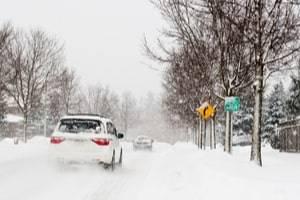
Four Tips for Reducing Roadway Collision Risk this Winter Season
 In even the most ideal conditions, venturing out onto the highways as a motorist is scary and can be downright dangerous, posing many risks to our health and safety. Car accidents happen on all kinds of roadways, for a million different reasons, and no one is immune to the hazards responsible for these collisions. Whether the source of an accident is due to road construction, a negligent driver, or inclement weather, prevention efforts on behalf of motorists nationwide can go a long way in reducing our collision risks. This is especially the case for those who live in cold-weather regions throughout the winter season, as roadways are exceptionally hazardous during these icy, snow-filled months.
In even the most ideal conditions, venturing out onto the highways as a motorist is scary and can be downright dangerous, posing many risks to our health and safety. Car accidents happen on all kinds of roadways, for a million different reasons, and no one is immune to the hazards responsible for these collisions. Whether the source of an accident is due to road construction, a negligent driver, or inclement weather, prevention efforts on behalf of motorists nationwide can go a long way in reducing our collision risks. This is especially the case for those who live in cold-weather regions throughout the winter season, as roadways are exceptionally hazardous during these icy, snow-filled months.
Preparation is Key
The Occupational Safety and Health Administration (OSHA) emphasizes the need to pay special attention to safe driving habits during the winter months, reminding us that preparation is key in not only the prevention of collisions but also in the event that you are involved in one. Being prepared better equips you to handle the challenges that come with the aftermath of a crash, like avoiding movement that might worsen any injuries you have incurred. As the winter months approach and you get ready to hit the roads, prepare in the following ways to lessen your chances of collision:
- Tune-up: Staying on top of your vehicle maintenance is crucial before and during the winter months. Be sure to inspect your tires and all of your lights, including headlights, brake lights, and emergency flashers. The National Highway Traffic Safety Administration (NHTSA) recommends having your mechanic check your battery as well to ensure you have enough amperage, voltage, and reserve capacity. Do not forget to keep your windshield wipers in proper working order, too, with enough fluid in the washer reservoir. Also, make sure your front and rear window defrosters are fully functional.
- Get Packing: Have a supply bag packed and stored away in your car for emergencies, should you end up stranded. This will come in handy in the event you are involved in a collision and need to wait for help. Pack blankets, food, water, medications, flashlights, jumper cables, and an abrasive material, like kitty litter. Flares, an ice scraper, and snow brush are also essentials for winter driving emergencies.
- Rehearse: Carve out some time to practice driving your vehicle in winter weather conditions before you set out for longer trips. Rehearsing your movements beforehand will help you get comfortable operating your car in the ice and snow. OSHA recommends practicing in the daytime, in an empty lot. Try steering into a skid and getting familiar with your brakes by pumping non-antilock brakes or stomping on antilock brakes.
- Drive Defensively: Brush up on defensive driving techniques and put them into practice the moment you hit the road. Continually scan your mirrors to keep an eye on what is happening around you, do not tailgate, and obey the rules of the road, especially speed limits. Cut out any distractions, from texting and talking on the cell phone to eating while driving. Keep your hands on the wheel and your eyes on the highway. In the wintertime, in particular, do not crowd snowplows. Give them space and pass with extreme caution.
Contact an Orland Park Car Accident Lawyer
If you find yourself in a car collision due to a negligent driver during the winter months, do not panic. You may be entitled to compensation for your injuries. Reach out to a qualified Cook County personal injury lawyer, who can address your concerns and help protect your rights in a court of law. Call Schwartz Injury Law at 708-226-9000 today to schedule a free consultation.
Sources:
https://www.nhtsa.gov/winter-driving-tips
https://www.osha.gov/Publications/SafeDriving.pdf
 Free Camp Lejeune Case Review
Free Camp Lejeune Case Review






